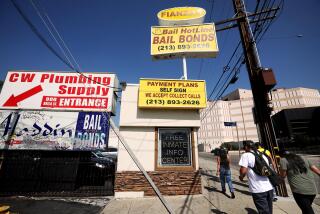Editorial: The evolving reform efforts of L.A. County Dist. Atty. Jackie Lacey

In the closing weeks of the long and contentious 2012 campaign for Los Angeles County district attorney, Jackie Lacey fielded questions at a South L.A. church filled with activists and organizers who were advocating near-revolutionary changes in the criminal justice system. They asked the candidate: What would she do to make sure fewer people go to prison? Didn’t she agree that drug use and possession should be decriminalized? How quickly would she overhaul the bail system to make sure the poor are treated the same as the rich while awaiting trial? Would she ensure that mentally ill offenders get community-based treatment instead of jail? Would she demand so-called split sentences, under which convicted felons spend only part of their terms in jail, the other part on parole-like supervision?
Her opponent hadn’t shown up to the forum, so Lacey had the audience to herself. She could have owned it. With a few platitudes and some vague words of support, she could have had everyone cheering.
Instead, she proceeded to slowly and methodically answer questions as though she were deflating balloons, popping some immediately, letting the air slowly out of others.
Her role, she said, was not to keep people out of prison but to keep people safe. Drugs damage the users, their families and their communities, she said, and the criminal justice system should dissuade young people, especially, from using drugs. Bail is complicated, she said, but gives the accused an incentive to show up for trial.
At one point, when a question was posed by a man who identified himself as a former jail inmate with a mental health challenge, Lacey politely deflected his call for a wholesale reimagining of society’s treatment of mentally ill offenders, and instead asked about his particular circumstances and offered words of encouragement.
Much of the audience was counting on a liberal, reform-oriented stance from a candidate in the running to be Los Angeles County’s first female, and first African American, top prosecutor, and the first Democrat in the position in 12 years. One activist, listening in the pews, put the best face on Lacey’s presentation. “She’s conservative,” she said, “but I heard several openings. I think we can have some productive conversations with her about reform. She will engage.” Among those figurative deflated balloons, the activist sensed, Lacey might let a few float, if only to see where they could go.
Elected in November 2012, Lacey is a career prosecutor and administrator, public-safety oriented, not given to sweeping statements or convulsive policy directives. The Times endorsed her, sensing a promising combination of caution and curiosity — an openness to exploring the kinds of reforms for which this page has advocated: treatment instead of incarceration for low-level drug offenses and for offenders whose crimes were linked with mental illness. Rehabilitation and education programs in and out of jail. Smarter, fairer, more effective — and more cost-effective — justice.
In her first year and a half in office, the district attorney has kept a low public profile, but recent weeks have produced evidence of her thinking, talking and now acting on carefully considered criminal justice reforms. In May, as the Board of Supervisors debated whether to move forward with a $2-billion jail project — and as many, including The Times, called instead for more aggressive diversion of mentally ill accused and convicted offenders to community-based treatment — Lacey candidly told the supervisors that the county could do more diversion.
“I’ve seen the future,” she told them, in jurisdictions where prosecutors, courts and others in the criminal justice system divert mentally ill people from jail.
Lacey also led a summit of county leaders, treatment providers and others to work through the challenge of dealing with the mentally ill in the criminal justice system and to find possible solutions. Taking a break during the second day of meetings, she told The Times last week that she was confident prosecutors and the courts could provide a “path to wellness” with a more deliberate approach to diversion.
“We’ve been dancing around and doing it in pilot form for a long time,” Lacey said, adding a note of compassion for people — perhaps like the man she encountered at the candidate forum in South Los Angeles — in need of medical care but caught up instead in the criminal justice system.
The task force is expected to present preliminary findings and plans to the Board of Supervisors on Tuesday. Were Lacey so cautious as to reject any program that would divert criminals from jail, the county would never have gotten to this point; and were she an unquestioning supporter of diversion, she might have left the supervisors unsure that clear thinking, rather than enthusiasm, is driving the effort.
In another move worth noting, Lacey dropped her initial opposition to split sentencing, issuing a June 30 directive instructing all 1,000 deputy district attorneys to work with courts to ensure that a portion of each felony jail sentence is served under supervision in the community, where appropriate. To be sure, this enlightened approach was slow in coming and then nearly inevitable, given that as of Jan. 1, all courts will be required by the state to split sentences or explain why they didn’t. But unlike most Los Angeles judges and defense lawyers, Lacey opted not to wait.
As for bail reform, Lacey says it could make sense to conditionally release some accused people without bail if they can demonstrate that there is a safe and reliable place for them to await trial. It’s a cautious response — the kind that may try the patience of those reformers who’d like to see faster progress, and yet satisfy them that they have a district attorney who listens and, after study and deliberation, moves forward.
Follow the Opinion section on Twitter @latimesopinion
More to Read
A cure for the common opinion
Get thought-provoking perspectives with our weekly newsletter.
You may occasionally receive promotional content from the Los Angeles Times.





